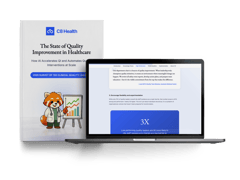
How to Measure Operational Efficiency
In business, there are plenty of straightforward ways to measure operational efficiency. But when it comes to healthcare, things aren't so black and white. How do you strike a balance between the most effective patient care with productivity and cost savings?
Let's take a look at what operational efficiency is in healthcare settings, and how you can measure and improve it.
Meet the Expert
Mical DeBrow is an accomplished healthcare leader and clinician with extensive expertise spanning pharma, healthcare payers and providers, and healthcare information technology.
What Is Operational Efficiency in Healthcare?
Operational efficiency in healthcare is about aligning resources with patient needs. It involves having the right staff, tools, and supplies available for each patient when they need them.
At the patient level, operational efficiency translates to a smoother healthcare journey. It can lead to quicker diagnoses and more effective treatments, ultimately improving patient outcomes.
As resources in healthcare become more scarce and expensive, operational efficiency also becomes a necessity.
It's important because it directly impacts the quality of care. Efficient operations mean patients receive timely and effective treatments.
» Use these advanced tech solutions to drive operational efficiency.
What Impacts Operational Efficiency in Healthcare?
- Staffing Models: Staff-to-patient ratios can often lead to heavy workloads, staff burnout and inadequate care. Instead of sticking to rigid ratios, staffing decisions should be more patient-centered. By aligning staffing with patient needs, we ensure the right personnel are available when needed, enhancing efficiency.
- Resource Demand: The growing demand for healthcare resources, along with their increasing scarcity and cost, directly impacts operational efficiency. Healthcare providers should strategically manage their resources to meet this demand without compromising care quality.
- Access to Resources: Placing resources closer to the point of care can boost efficiency. This approach reduces time spent retrieving resources and enables quicker response times in patient care.
Seamless knowledge access is one of the most effective ways to achieve operational efficiency. Our latest report details the current state of knowledge management in hospitals and the impact it's having on healthcare at large.
» Here's how to drive operational efficiency in healthcare using innovative approaches.
How to Measure Operational Efficiency
When you're trying to assess how efficiently things run in your organization, you need to look at multiple areas where bottlenecks can arise.
How Effectively is Data Being Used?
Operational efficiency and data go hand-in-hand. It's not about hoarding every bit of data we can get our hands on. Instead, it's about zeroing in on those key data points that have a direct impact on patient care and outcomes. That's how we make sure our data is working for us, not the other way around.
How Effective is the Staffing Model?
Efficiency is also tied to how we manage our staffing models. Having the right personnel available when and where they're needed most is crucial. By closely observing patient needs and aligning that with our staffing, we pave the way for better outcomes.
Smartly Are Resources Being Managed?
Managing resources, like pharmaceuticals, is a key part of operational efficiency. We need to make sure we're using our resources wisely and not wasting anything. For instance, if we're using powerful drugs for things like weight loss when they're not really needed, that's a sign we might not be as efficient as we could be.
How Well is Technology Being Leveraged?
Health information technologies, like electronic health records and monitoring tools, are game-changers when it comes to operational efficiency. They cut down on time spent collecting info we don't need, freeing up healthcare providers to concentrate on what really matters-patient care.
How to Improve Operational Efficiency in Healthcare
If you've run through the list of metrics to assess whether things are running smoothly, and finding that they aren't quite there, it's time to look at ways to improve efficiencies.
- Enhancing Access to Knowledge: Let's get all our information in one place. It's easier to access and ensures everyone is on the same page.
- Follow Protocols: We've got to make sure we're all following the same playbook. That means implementing industry best practices among healthcare teams and checking regularly to make sure we're on track.
- Use Technology: Knowledge management systems can help get key, vetted information to everyone who needs it. It's about improving communication and reducing errors.
- Automate: Let's get the machines to do the heavy lifting. Automation can streamline repetitive tasks, cut down on errors, and ramp up efficiency.
» Here's how C8 Health can make life easier for your medical team.
Balancing High-Quality Care with Operational Efficiency
One of the biggest challenges in healthcare is balancing high-quality care with operational efficiency demands.
The key is to remember that operational efficiency is not just about healthcare cost reduction-it's about improving the quality of care.
By focusing on patient needs, outcomes, and smart use of data, healthcare organizations can increase operational efficiency without sacrificing the quality of care.


